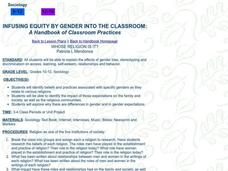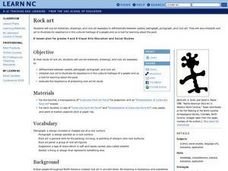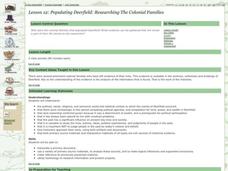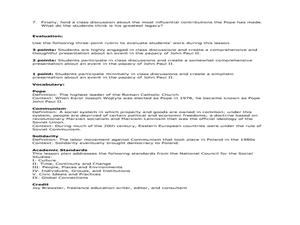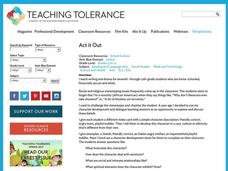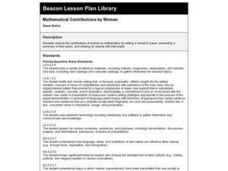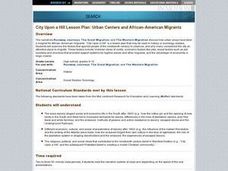Curated OER
Rwanda: You Go, Girls
Young scholars examine the genocide that took place in Rwanda in 1994 and focus the post-genocide success of women. They study websites to examine how women are challenging their traditional roles in Rwandan society.
Curated OER
Rock art
Students study rock art they use art materials, colored photographs and rock art examples to: differentiate between symbol, petroglyph, pictograph, and rock art. They interpret rock art to illustrate its importance in the cultural...
Curated OER
Populating Deerfield: A Workday for Researching the Colonial families
Eleventh graders explore who were the colonial families that populated Deerfield and what evidence can be gathered that reveals a part of their life stories to the researcher.
Curated OER
Pope John Paul II: Triumph Over Communism
Learners discover the background of Pope John Paul II. In this modern history lesson, students research the life of Karol Joseph Wojtyla (Pope John Paul II) in order to understand how his past paralleled his papacy.
Curated OER
Act it Out
Students discuss racial stereotypes. In this racial stereotypes lesson, students develop a character from information given to them on an index card. Students give their character a race different from their own and write a description...
Curated OER
SOS from Sudan
Students examine the Darfur crisis. In this current events lesson, students visit selected websites to discover details about the history of Sudan, ethnic cleansing by the Arab Janjaweed militias, and the condition of children caught in...
Curated OER
Social Studies: Ramadan Observance
Students discuss Ramadan and the practice of fasting. Working in groups, they visit Websites and complete worksheets about the Muslim holiday. Students write letters role-playing as someone unfamiliar with a celebration and then write...
Curated OER
History: Women Wanting to Work
Students compare and contrast the economic roles of women throughout history in the United States, India, and Israel. After examining pictures of women from various time periods, they share observations. They watch video clips and...
Curated OER
"He Says, She Says"
Stuents compare and contrast male and female views of love and beauty in classic Chinese and Japanese society through the reading and evaluation of prose and poetry. Chinese and Japanese art is also studied.
Curated OER
Mathematical Contributions By Women
Third graders explore the contributions of women to mathematics by writing a research paper, presenting a summary to their peers, and sharing an activity with their peers. They use a variety of reference materials to gather information...
Curated OER
New War Against Whom?
Seventh graders write an essay on the Muslims involved with the terrorist attacks on the World Trade Center. They express how the attacks made them feel and what they can do to help.
Curated OER
The Four Religions of East Asia
Students compare and contrast the four main religions of Asia (Buddhism
Confucianism, Daoism, and Shinto). This lesson is intended for use in the middle school Social Studies classroom.
Curated OER
Mr. Bush in Washington
Young scholars study about George Washington Bush and write a biography about him in a small group. To gain a better understanding of him, they listen to a biography on a tape about him. They visit various sites about him to help them...
Curated OER
City Upon a Hill: Urban Centers and African-American Migrants
Students examine why fugitive slaves migrated to cities and towns rather than rural areas. In this lesson, students consider the social, economic, and political benefits provided by cities and towns in comparison to rural areas.


